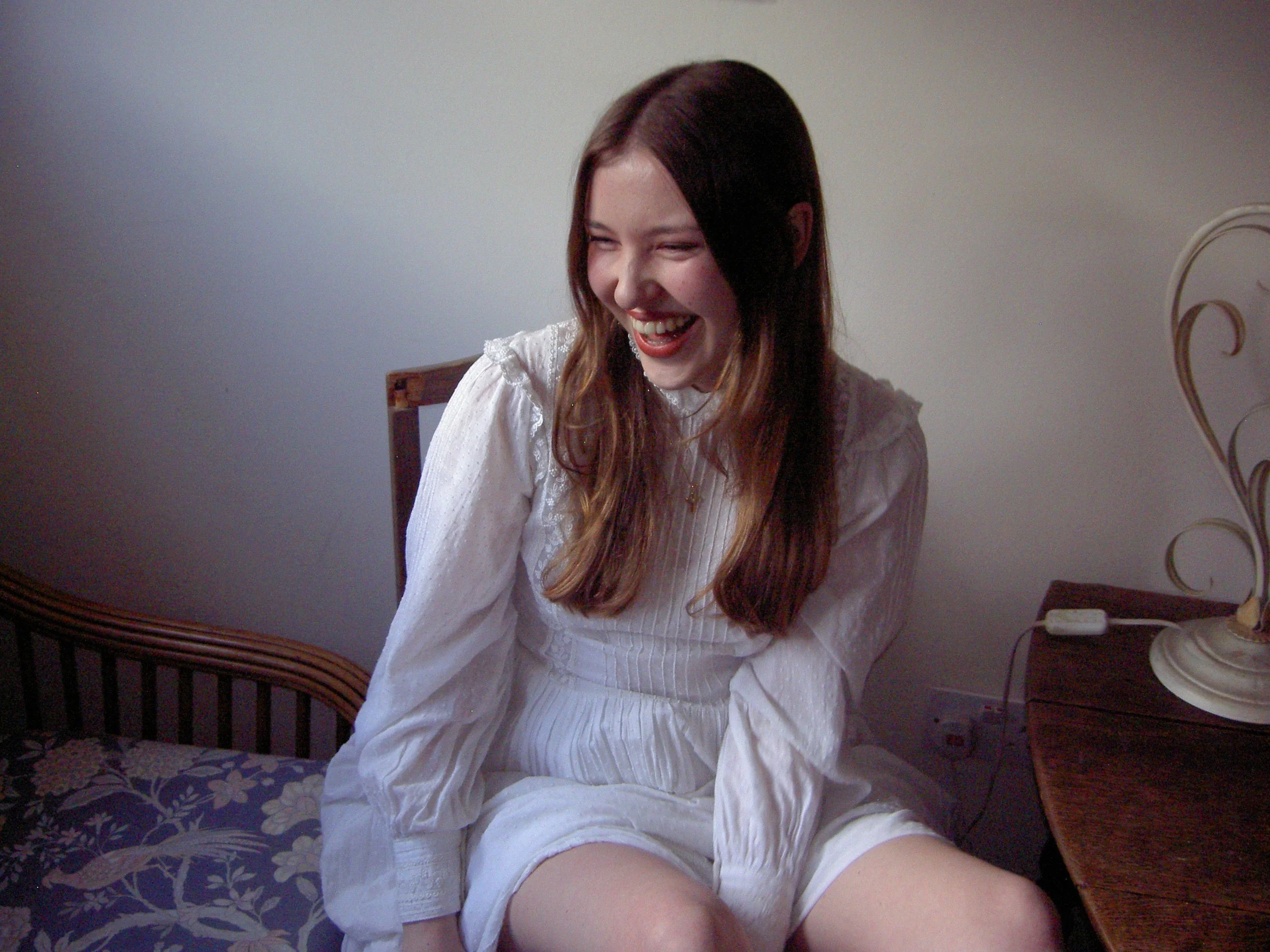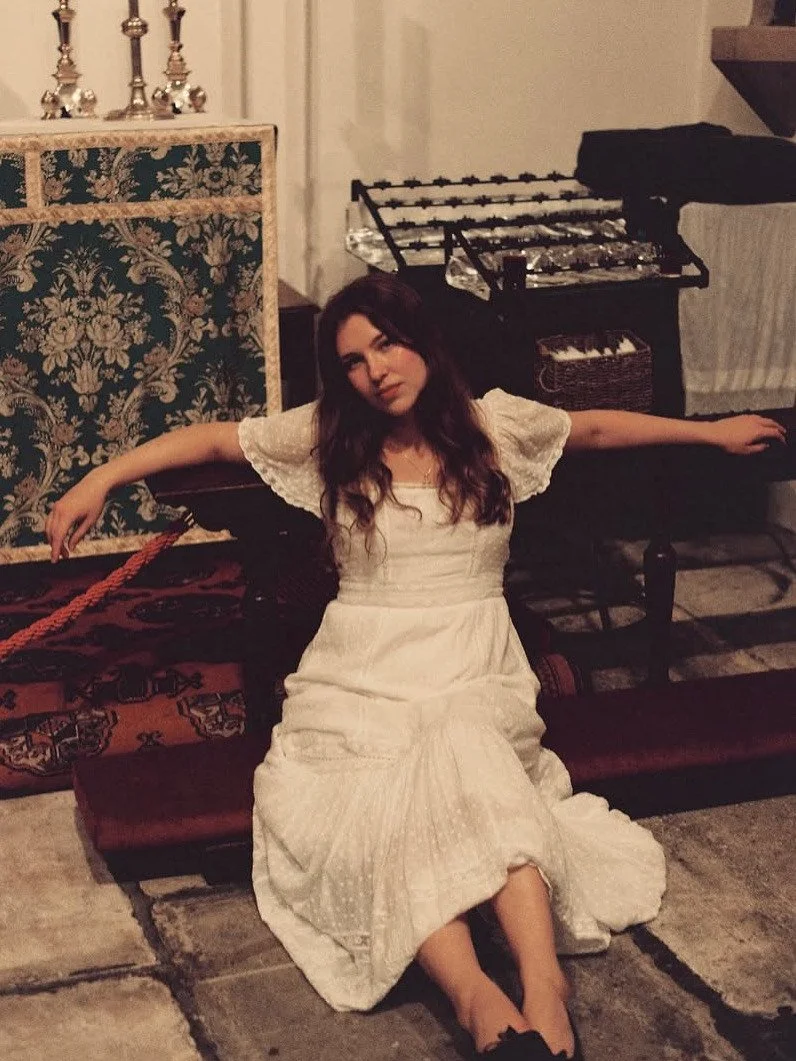A Band You Should know: Avice Caro
Released under the name Avice Caro, London-based singer and songwriter Maria Dearest’s album, Home Demos, brings her own perspective to a traditional folk sound.
The eleven song release’s haunting nature feels reminiscent of a tape found tucked away in an attic. With Maria’s beautifully harrowing solemn vocals that could be easily mistaken for those sung by a 1960s folk great. Her melodies, isolated, are only accompanied by the light guitar strums of Alfie Jones, and the residual static of the recording. Recorded directly to a 1950s tape recorder with 1940s ribbon microphone, the album has an authentic and intimate lo-fi sound that perfectly compliments her majestic fairytale and lullaby inspired lyrics. Lyrics like, “Close your eyes, my sleepy head,” feel almost as if Maria is singing directly to the listener, recreating those familiar feelings felt during childhood listening to their parents' lullabies as they dozed off to a peaceful sleep.
Wanting to know more about the unique generation breaking release, I called Maria as she walked around London on a sunny autumn day to talk about Home Demos and the London music scene.
The songs each feel like their own fairytales or lullabies. When you were writing is that something you intended for them to be?
The way that I came into song writing itself was when I was a child, my parents used to tell me folk stories and sing me lullabies. That was my favourite time of day. When I started song writing, it took me back to that place. Whether or not I write a song with the intention of it sounding or feeling like a lullaby is quite a difficult thing to answer, because my song writing sort of style is quite sporadic and very intuitive, I just sort of let it flow and happen. There is one song on the record that I did write with the intention of it being a lullaby, and that's called “Lullaby for the Night”. It has those sleep and dream themes throughout.
I felt it the strongest with that song, especially with the opening lyrics, ‘Close your eyes, my sleepy head’, it feels like you're directly singing to the listener.
I wrote that song when I was going through a huge phase of being really obsessed with lullabies. I made a playlist on my phone of just trad folk lullabies.
That’s quite sweet knowing that. Your music has a very traditional folk sound, what inspired you to make music with that sound?
Growing up in England. England is quite a haunting and spooky place, it's no surprise that you have so much gothic literature and so much sort of romantic poetry from the country. I think a lot of it comes back to the feeling of the coming of seasons we feel here, it's so rainy, wet, and cold. In the same way those writers made light of all that wintry darkness, maybe my music is a way to do the same. I've always enjoyed being sat inside with a cup of tea, looking outside the window, watching all the purples, the lilacs in the sky and the leaves from the trees fall.
I remember when I was maybe about fourteen or fifteen and came across Nick Drake's Five Leaves Left record, I listened to it on repeat every single day for maybe like a year. I have fond memories of walking through Hampstead Heath and just listening to it. Naturally, as a songwriter, you pick up on the things that you like, and the things that you don't like as well. I really love the acoustic, intimate sort of feel to music.
A lot of the time when people make music today that is inspired by what has come before, they bring a contemporary take to the sound. However, you do the complete opposite; the songs on Home Demos feel complete with all the brilliant qualities of the music made in the 60s.
Thank you. I love being a sort of outsider in the London music scene in the sense that I love going to lots of live music, listening to all kinds of genres, bands, and artists, but when I'm making music, I'm not thinking about the outside world. I just want to make the music I want to make. I have a song on the record, “Bird Song” which is a complete acapella ballad, if I was pitching that to a record label they’d be like ‘what the hell are you doing?’ I make the music I want to make, and there aren’t many external influences other than what I want to create.
I think that outsider observation is really interesting too because your music is outsider, but at the same time you’ll be playing shows with artists like DJ Python, Deer Park, and Organ Tapes, as you did at the Scenic Route show in August. Even though the music you make is so different from the others there’s still a place for you in there. That’s something I found really fascinating.
That's true. Brian [DJ Python] and I both bonded over the fact that we really love traditional folk music, a lot of the things that he likes listening to are the things that I like. It’s amazing how one person can take so many different things from a song, sound, or piece of music. Obviously with Brian's music, it's more electronic, and ambient compared to mine which is more acoustic.
Definitely, London also feels as if there is space for everyone no matter their genre or musical background.
Absolutely. Using my live band for example, some of them are classically trained and they're playing in orchestras, some of them are more avant-garde, using whips with cellos and strings. The scene in London is really fascinating, because everybody just loves being a part of music. There’s a real community here, everybody is collaborating on each other's projects, and has their own projects going on. It's a really inspiring place to be.
Home Demos was just your vocals and Alfie on guitar. Why didn’t you get the live band involved for the recording?
We didn’t have access to a recording studio where we could get all the strings recorded, we just had a 1950s tape recorder. We worked with what we had, I'm grateful that when we perform live we’re able to do it with strings but it wasn't possible for us to put strings on the record.
Yeah, how did the idea arise to record the album on a 1950s tape recorder?
It was Alfie, he loves vintage equipment, not just music equipment, but also like he rides and fixes up old motorcycles. One day I went over to his house, and he had the tape recorder out, he told me he had just bought it online. He told me, he thinks that it probably was used like in the 1950s and 60s at police stations, when they were interviewing people. Then in the 1960s and 70s as well, lots of folk artists used similar equipment to record their records. He showed me a demo he recorded on it, and I fell in love with the sound. It was so warm, cosy, and it took me back to that early Bert Jansch and Sandy Denny type of sound.
It's perfect. I think it complements your music so well. I wanted to ask, does Avice Caro feel like a character in a way.
In some ways it does. I think that the reason why I kind of created Miss Caro is because I found it really helpful to sort of compartmentalise my life in that way. When I'm at work, or when I'm with my friends and family, I'm Maria, but having this project in my brain, it allows me to kind of really dedicate as much as I can to it. It also separates myself from different parts of myself, I don't cringe or get embarrassed as I would when it all comes to Maria. It’s different Miss Caro, doesn't have a job, she doesn't read the news, she doesn't know anything about politics, but you know, of course Maria does. It's like Miss Caro lives in a separate world that is beautiful, shiny, unreal, and untarnished from the day-to-day.
That’s such a sweet way to think about it.
It helps to have a nice place to go to, that's just beautiful, nice, and peaceful.
For sure, especially when you're separating your life in two.
Yeah, exactly. Well, that's not to say that things I experience don't seep into that world. I mean, obviously, when you're a songwriter, some of the things that you do draw on are your day-to-day experiences and things, but I guess it's with this project, it's a question of how do I make it almost as separate as myself as possible?
Yeah and that seeps into the lyrics, they don’t feel directly about you, it’s more about storytelling.
It is separate from this world, I like to describe things indirectly, so if I have a feeling, say I'm like ‘oh, I'm in love’, it's like, how do I say I'm in love without saying ‘I love you’? That can be really fun, when writing a song, it's really thinking outside the box and throwing everything at it.
I could imagine. It’s like a game, trying to avoid the exact words but still get the meaning across.
Exactly, as a lot of my writing is allegorical and metaphorical, I want to give the listener gaps to fill in. I don’t want them to hear my music and be told how to feel.
How do you feel when you’re making music?
When I'm making the music, I'm just having so much fun. I love words, colours, animals, and melodies. I feel so at peace when I'm song writing and sometimes, if I am feeling angry or upset, working through that emotion by putting it in a song and making something light of something that's dark or making something beautiful of something that's really ugly and painful is just the most rewarding feeling. I love going into different worlds, where there are seagulls, sailors, birds, and princes. It's a lot of fun to play with all of these things and to go there. Making music is the greatest pleasure for me.
It's so nice hearing you talk about having such a positive connection to making music.
I think a lot of people think that music has to come from sadness, really chiselling away or really burning yourself out to create something that's perfect and huge. At least for me, my music is not like that at all, it's not a thing that has caused me immense stress or grief. It's like a place that I go to that brings me a lot of happiness and I find it really easy and peaceful. It is a real pleasure to be able to make that record.
That’s such a wonderful perspective, it feels like for the majority music is something they make to convey deep sad emotions.
Music is such a personal thing, so is song writing, everybody does it in their own way and there's really no right or wrong way to do it. I'm just grateful, that for me, it's a really nice and fun thing.



